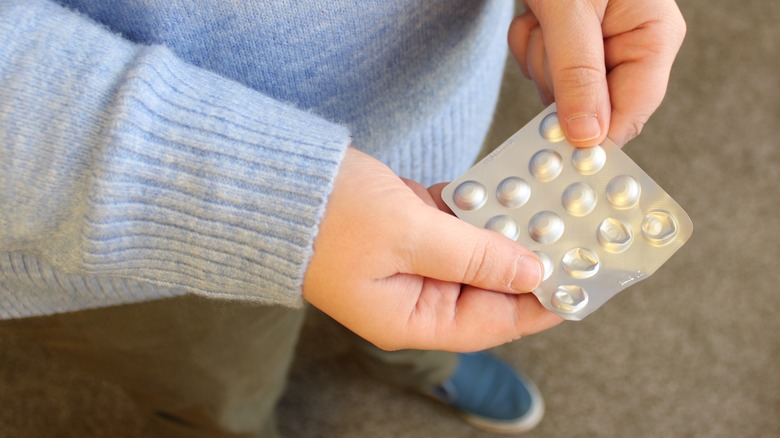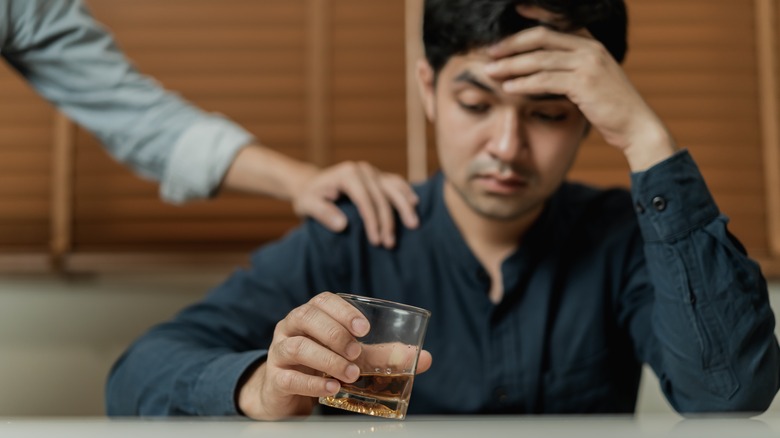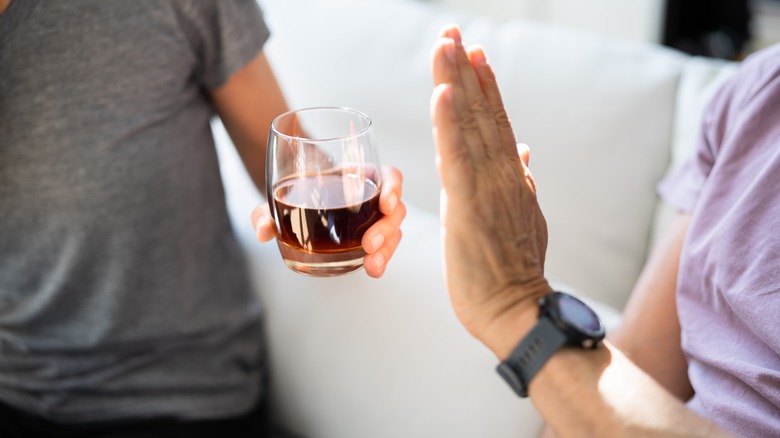Is There A Risk To Drinking Alcohol On Bipolar Medication?
Having bipolar disorder can feel like an emotional whirlwind is continuously going on inside your mind. The drastic shifts in mood associated with bipolar disorder can sometimes make it difficult to function, as they can contribute to friction in relationships and interfere with other aspects of daily living, such as work and school. According to the National Institute of Mental Health (NIMH), having bipolar disorder can make someone act impulsively without being mindful of the potential consequences. Bipolar disorder can also be psychologically painful for those who experience it. A 2019 article published in Medicina reports that individuals with bipolar disorder may be significantly more likely to take their own lives.
If you live with bipolar disorder, there is hope for managing your condition. Many individuals with bipolar disorder can live more fulfilling lives with the help of a long-term treatment plan. Bipolar disorder is often treated with a combination of techniques, including psychotherapy and medication management.
For bipolar disorder treatment to be most effective, a person may have to sacrifice certain habits that they used to indulge in. Although drinking alcohol is considered acceptable in many cultures, it may not be safe for people who are taking medication for their bipolar disorder. Here's what we know.
If you or anyone you know is having suicidal thoughts, please call the National Suicide Prevention Lifeline by dialing 988 or by calling 1-800-273-TALK (8255).
Effects of drinking alcohol while on bipolar medication
Psychiatric medications have shown promise for improving the lives of individuals with bipolar disorder. As explained by the Mayo Clinic, people with bipolar disorder should receive lifelong treatment with medications to minimize the risk of a relapse in their symptoms.
There are different medications available to treat someone who has bipolar disorder, and one of the most popular classes is mood stabilizers. According to the Psychiatric Times, lithium is one of the most responsive mood stabilizers for treating bipolar disorder. In addition to significantly lowering suicide risk, it's believed lithium may lower the risk of cancer, heart disease, and stroke.
However, lithium can sometimes have sedating side effects, such as slurred speech and slower reaction time, as reported by GoodRx Health. Drinking alcohol delays neural activity in the brain and spinal cord, so mixing alcohol with lithium could exacerbate the side effects of the medication. There are also some instances where drinking alcohol while on lithium can lead to lithium toxicity.
Mood stabilizers can also be prescribed alongside other classes of medications for the treatment of bipolar disorder, including antipsychotics and antidepressants. Alcohol should be avoided when taking an antidepressant called Wellbutrin. Drinking while using this medication can contribute to adverse side effects like seizures, hallucinations, panic attacks, and suicidal ideation (per Drugs.com).
Quitting alcohol while on bipolar medication
In some cases, individuals with bipolar disorder may attempt to self-medicate with alcohol, which leads to further complications by exacerbating their symptoms. Although there are significant risks associated with drinking alcohol while on bipolar medication, it doesn't mean that it's always easy to quit the habit, as mental illness and substance use are often intertwined.
The National Institute on Drug Abuse (NIH) reports that 1 in 4 individuals who live with a serious mental illness also have a substance use disorder. A high risk of alcohol use disorder exists among individuals with bipolar disorder, according to Our World in Data. As a result, people with bipolar disorder may require additional support to kick the habit of drinking.
If you have bipolar disorder and wish to stop drinking, there are steps you can take to be successful in your goal. As explained by HelpGuide.org, keeping away from people who influence drinking behavior and any reminders of drinking can help you stay free of alcohol. You can set boundaries with your loved ones by letting them know you're quitting drinking and that you wish for them to refrain from doing so in front of you. According to Healthline, 12-step programs and cognitive behavioral therapy may also help someone with bipolar disorder stop drinking.
If you or anyone you know is struggling with addiction issues, help is available. Visit the Substance Abuse and Mental Health Services Administration website or contact SAMHSA's National Helpline at 1-800-662-HELP (4357).



